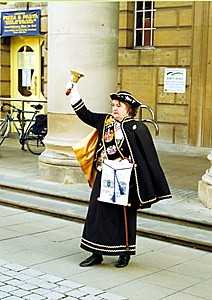|
The Town Crier The town crier was an officer of the court who made public announcements in the streets and could also be used to advertise coming events. Their colourful dress dated from the 18th century, usually a red and gold robe, white breeches, black boots and a tricorn hat. They also carried a hand bell to attract people's attention, as they shouted the words "Oyez, Oyez, Oyez!" before making their announcements and were often known as the bellman as a result, the word Oyez meaning Hear ye, a call for silence and attention, deriving from the Anglo-Norman word for listen. In mediaeval England, town criers were the chief means of news communication with the people, since many were largely illiterate at a time before popular printing. Royal events, local bylaws, market days and advertisements, were all proclaimed by a crier or bellman. Bourne had its own town crier whose salary was paid through the Manor of Bourne. In the late 19th century, for instance, when the Marquis of Exeter was Lord of the Manor, the office was held by Samuel (or Silas) Coulson, a fruit and game dealer from Eastgate, and during the annual meeting of the Court Leet and the Great Court Baron in June 1888, he was re-appointed to the post, having already held office for seventeen years. He continued as town crier until 1900 when Joseph Dallywater was elected during the annual dinner of the Court Leet held at the Town Hall on Tuesday 27th June although his time in office was short-lived because he died in September 1901, aged 36. Earlier town criers included Mr Parnham, who died on 31st January 1825, aged 65, after many years in the job as well as that of sexton at the Abbey Church, and Thomas Mason, of West Street, who held office in 1850. By 1913, the post was held by Richard Lloyd of Eastgate. He was also town crier in 1915 when the gas supply failed in Bourne on Saturday evening 28th August. The engine at the gasworks in Eastgate broke down and the manager immediately told nearby residents that their supply would be cut off for at least 24 hours while repairs were carried out. The town crier was called out at 10 am on Sunday morning to alert the rest of the town about the situation when he toured the streets urging housewives who were about to start preparing Sunday lunch to light fires and use those for cooking instead. Richard Lloyd remained crier for several years although by 1922 he had moved to Victoria Place and he was still in office in 1926 but he was the last to hold this appointment which appears to have died out soon afterwards. Many of the larger villages also had their own town criers, notably Billingborough and the archives contain several references to their activities. The Grantham Journal reported on Saturday 10th January 1875, that “on Friday morning, the inhabitants were somewhat amused at hearing a special notice given by the town crier to the effect that the Fortescue Arms Inn ostler was lost, and any person restoring him to the crier would be rewarded. A rigid search was at once initiated, which resulted is the missing man being found, much to the delight of his friends and intimate acquaintances”. The Billingborough crier was also busy advertising coming events on payment of a small fee, such as the public lecture by a visiting clergyman on the subject of religious equality which was held at the public hall in March 1876 “but although the town crier gave notice in his accustomed manner in this and the adjoining village of Horbling, only about fifty persons were induced to enter the building”. Rippingale also had a town crier, in this case Richard Dale, a shoemaker, also known as Dick Dale. When he died suddenly in December 1888 at the age of 57, the Grantham Journal reported: “He was well known for miles around and the name of Dick Dale was familiar to many. He had discharged the duties of town crier for many years with efficiency and was always ready to assist or render any kind action to his neighbours.” The popularity of newspapers, radio and television has rendered the use of town criers ineffective but they survive in many towns as part of our tradition and contests as an entertainment are held regularly throughout the country to find the best.
REVISED NOVEMBER 2013
Go to: Main Index Villages Index |
